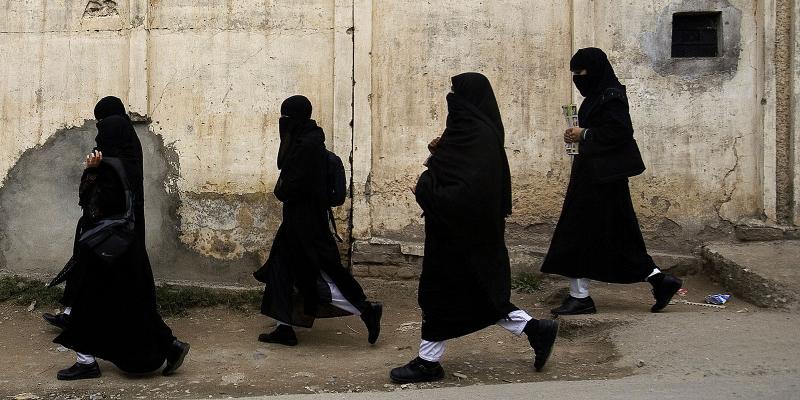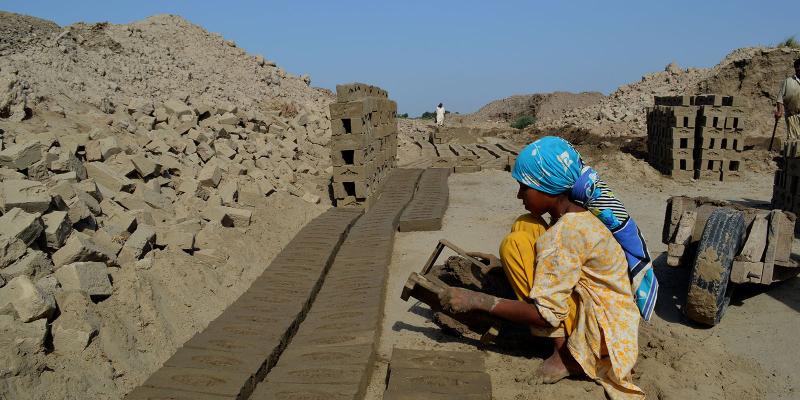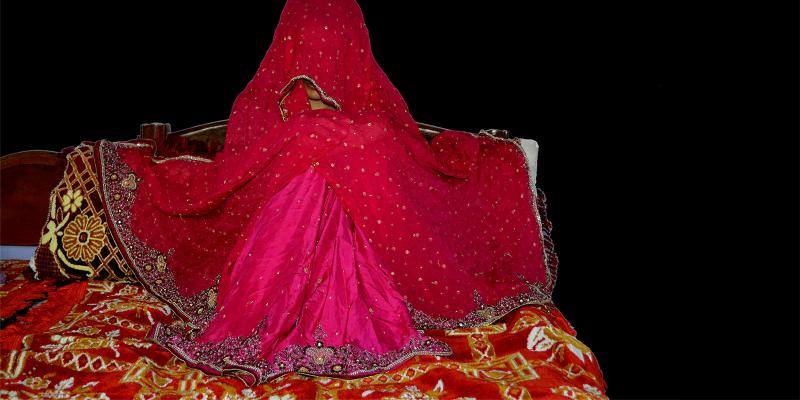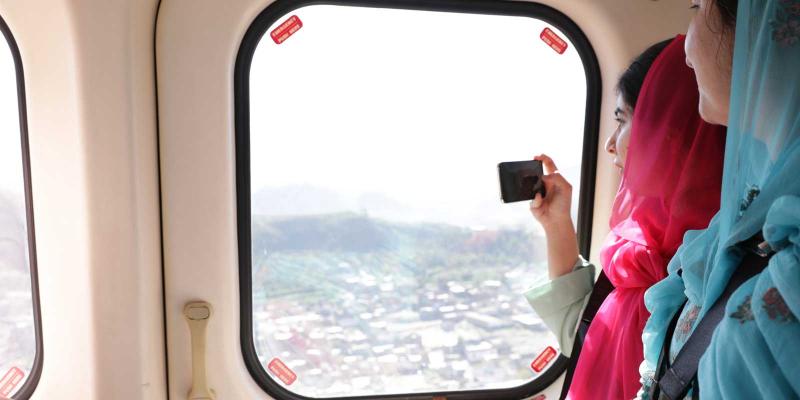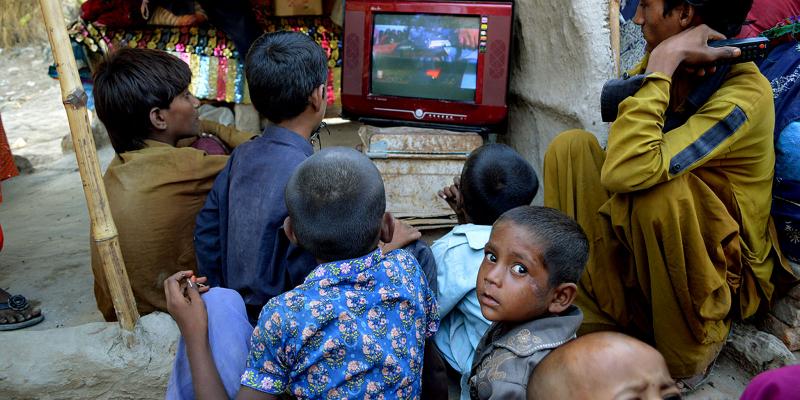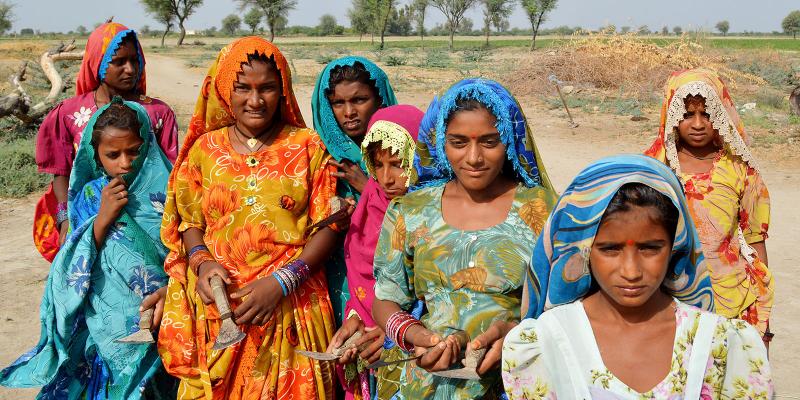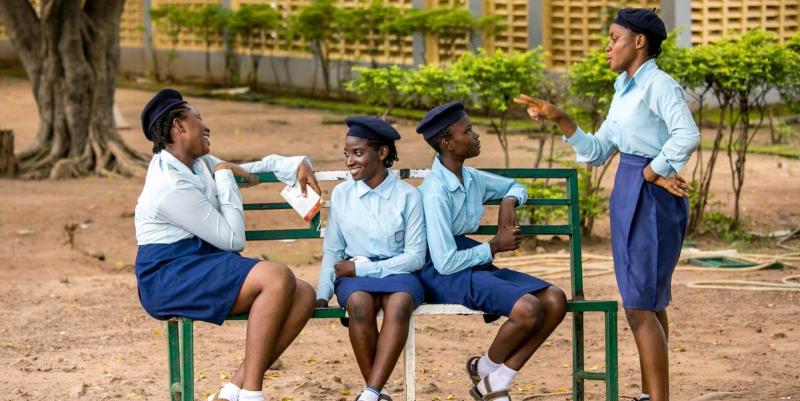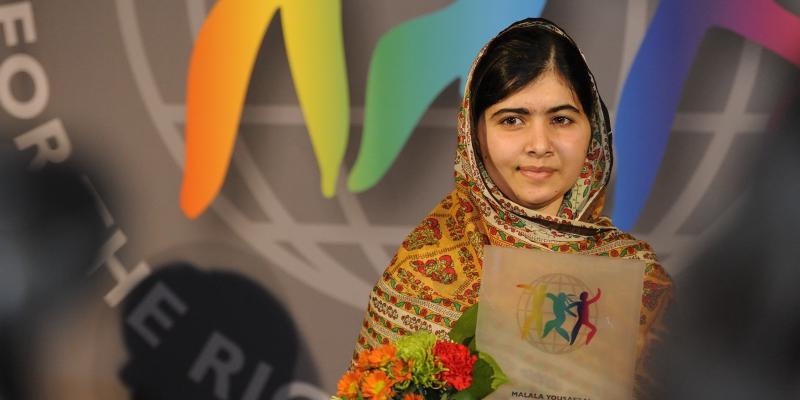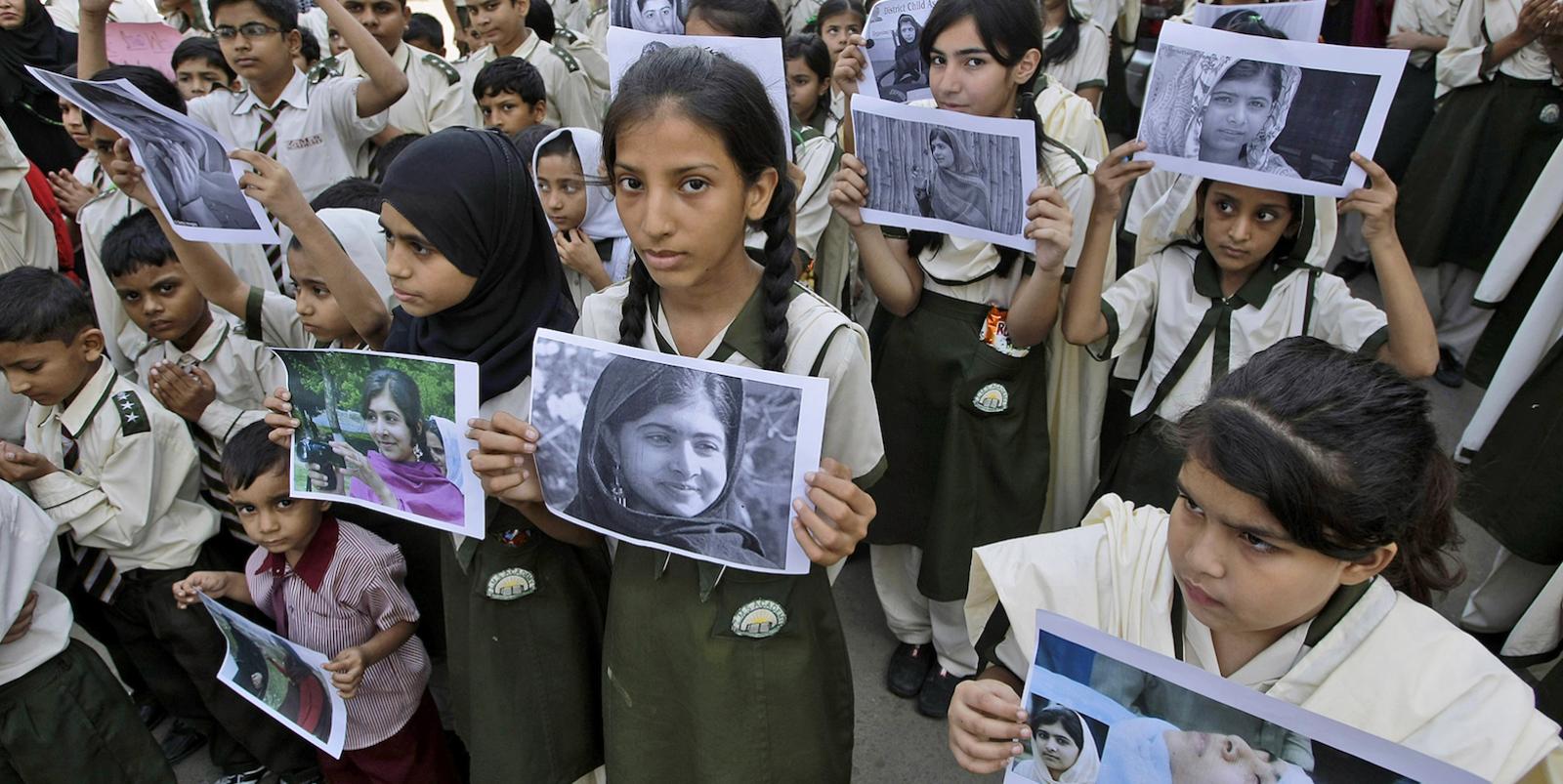
grows stronger
The Taliban thought they could silence Malala by killing her. Instead, they gave her an even stronger voice, which can now be heard all over the world. Malala is determined to continue fighting for girls’ rights.
“I don’t want to be famous for being the girl who was shot by the Taliban. I want to be the girl who fights for education,” says Malala. This is her story:
“Which one of you is Malala?” asks the man dressed in white. He hides his face with a bandana.
None of the girls on their way home from school in the back of the minibus say a word. But their faces reveal who Malala is.
The man raises his pistol and fires three rapid shots. The first bullet hits Malala in the head.
Malala has fought long and hard against the Taliban in the Swat Valley in Pakistan, for girls’ right to go to school. Now, at the age of 15, she is close to death.
But when Malala regains consciousness, she has become a symbol for girls’ right to education throughout the world.
When Malala is born, her arrival is not celebrated as much as it would have been if she had been a boy. Many Pashtun people, as people from the Swat Valley are known, believe boys are more important than girls. But Malala’s father Ziauddin is different. Right from the start, Malala is the apple of his eye.
In her book about her life, Malala says that she was born in the most beautiful place in the world:
“The Swat Valley is a heavenly place full of mountains, flowing waterfalls and clear lakes. The sign at the entrance to the valley reads ‘Welcome to Paradise’.”
In this ‘paradise’, Malala is set to experience earthquakes, and severe flooding that kills many people. But the worst thing of all is when the Taliban come to the Swat Valley. They threaten and kill people, forcing women to cover their faces and girls to quit school. They will bomb over 400 girls’ schools in Swat.
Girls hit hard
Malala spends a lot of time at her father’s school in the biggest city in Swat, Mingora. She learns early on how different boys’ and girls’ lives are, and how men are in charge. But Malala also learns from her father that things don’t have to be like that. He fights for everyone’s right to go to school – even poor people and girls.
When her family go to visit relatives in a mountain village, Malala notices that her cousin Shahida is missing. She is only ten years old, but her father has sold her to an older man who already has a wife.
Malala complains to her father about how girls are being hit hard in Swat. He replies that things are even worse in the neighbouring country of Afghanistan, just 150 km away. The Taliban there are forcing women to wear burkas to hide their faces, burning girls’ schools and abusing women who wear nail polish. Many of the Taliban are Pashtun people.
Arrival of the Taliban
Malala is ten years old when the Taliban come to the Swat Valley. They gather people’s CDs, DVDs and televisions and burn them in huge piles on the street. The Taliban also stop young children from being vaccinated against polio. They shut down cable TV channels and ban a board game that children love to play.
Then the Taliban set their sights on girls’ schools. When Malala’s family return from a visit to relatives in a rural area, there is a letter pinned to the school gate. It is a warning to Malala’s father not to allow the girls to continue wearing normal school uniform. Instead, they must wear burkas and cover their faces. After that, the girls always cover their heads when entering or leaving school.
No girls in school
It is now 2008 and the Taliban begin blowing up schools – mostly girls’ schools – almost every day. Malala is eleven and is interviewed on several TV channels. She speaks out for girls’ right to go to school. In a BBC interview in Urdu, the national language of Pakistan, she says:
“How dare the Taliban take away my right to education?”
Things go from bad to worse. The Taliban announce that all schools for girls are to be closed. From 15 January 2009 no girl in the Swat Valley will be permitted to attend school.
At first Malala thinks it can’t be possible. How could the Taliban stop her and her friends from going to school? But her friends ask who could stop the Taliban from doing it – after all, they have already got away with blowing up hundreds of schools.
Malala starts to write a diary about life in Swat under the Taliban. When it is read out on BBC radio it is under a made up name, Gul Makai, which means cornflower. Her school friends talk about the diary at school, but they don’t know it is Malala who is writing it. She talks about how it feels to be afraid, about the ban on girls going to school, and about being forced to wear a burka and hide her face.
When she is filmed for a documentary, Malala says, “They cannot stop me... our challenge to the world around us is: Save our school, save our Pakistan, save our Swat.” But soon the Taliban close down their school.
Widespread protests cause the Taliban to change their minds and allow girls up to the age of ten to attend school. Malala and her friends, who are too old to be allowed, go to school in their normal clothes, hiding their school books under their shawls. The girls’ headteacher calls it ‘the secret school’.
Then one day the army of Pakistan orders the inhabitants of the Swat Valley to leave their homes. The army are planning an offensive against the Taliban. Over a million people become refugees in their own country. Malala’s family leave the valley and are only able to return home three months later. The army say that the Taliban have been defeated, but soon the Taliban start to blow up schools again.
Serious threats
In January 2012 Malala travels to the big city of Karachi with her family. The provincial authorities have decided to name a school after Malala. She holds a speech for all the politicians, saying:
“We must work together for girls’ rights.”
In her book, Malala talks about sitting on the beach in Karachi and thinking about what life is like for girls and women in her country:
“We want to be able to make our own decisions and be free to go to school or work. Nowhere in the Koran does it say that a woman should be dependent on a man or have to listen to a man,” she thinks to herself.
While they are still in Karachi, Malala’s father sees on the internet that the Taliban have issued threats against two women, and one of them is Malala. “These two women should be killed,” he reads.
Malala’s parents tell her about the threat and her father says that she should stop speaking out about girls’ education and against the Taliban, just for a while.
“How could we possibly do that? I have been invited to speak at lots of events, and I can’t just pull out,” says Malala.
When the family return to Swat, the police show them the document about Malala. It says that because she has become well-known both in Pakistan and around the world for opposing the Taliban, a death threat has been issued against her.
The provincial government want Malala to become an ambassador for peace, but her family say it is too dangerous. Malala starts locking the gate to their family home every evening. Her father explains that the Taliban have started coming after anyone who speaks out against what the Taliban stand for.
School bus is stopped
Malala and her father are planning to travel to the villages in the Swat mountains during the next school holidays, to talk to parents and children about how important it is to learn to read and write.
“We’ll be like education missionaries,” says Malala to her father.
Malala’s mother will not allow her to walk to school any more. Instead, she always travels by rickshaw. She travels home with twenty school friends, on the back of a truck with a canvas roof. In the back of the truck there are three long benches.
The school bus stops at the steps leading up to Malala’s street. These days she is always afraid of the Taliban when she walks up the steps. Once the rest of her family have fallen asleep, she goes round checking that all the doors and windows are properly closed and locked. She prays to Allah for protection for her family.
Which one of you is Malala?
It’s exam time. On the night of 8 October, Malala sits up late studying for an exam in Pakistani history. Her whole family eat breakfast together. Today, Malala’s mother is going to start learning to read and write.
The school bus does two runs after school every day. Malala and her friends are chatting after the exam, so they take the second run, at twelve noon.
Suddenly two men dressed in white step out onto the road, forcing the minibus to make an emergency stop. One of them, wearing a hat and a bandana covering his eyes, climbs onto the back of the bus and bends to look in under the roof, near where Malala and her best friend are sitting.
“Which one of you is Malala?” he asks.
Some of the girls shout for help, but the man forces them to be quiet. Malala is the only girl who doesn’t have her face covered. Nobody says which one she is, but several of them glance at her. When the man raises his black pistol, Malala squeezes her best friend’s hand. The man fires three rapid shots. The first hits Malala in the head.
Awards and UN
Malala is flown first by helicopter to a military hospital, and then on to a hospital in the UK. That’s where she is when she regains consciousness a week later. One half of her face has been paralysed. But after an eight-hour operation the doctors manage to restore her facial nerves.
Malala receives several awards and even becomes the youngest ever nominee for the Nobel Peace Prize. In newspapers she is included in lists of the most influential people in the world.
On 12 July 2013, the day that Malala turns 16, she is invited to the UN. 100 young people from 80 countries have come to listen to Malala and the UN Secretary General, Ban Ki-moon, calls the day ‘Malala Day’. In his speech to Malala he says:
“I urge you to keep speaking out. Keep raising the pressure. Keep making a difference. And together let us follow the lead of this brave girl. Let us put education first. Let us make this world better for all.”
Malala replies to the head of the UN: “Today is the day of every woman, boy and girl who has raised their voice for their rights. Let us wage a global struggle against illiteracy, poverty and terrorism. Let us pick up our books and pens, they are our most powerful weapons. Education is the only solution. Education first.”
Photo top: Fareed Khan / AP / TT
Related stories
Långgatan 13, 647 30, Mariefred, Sweden
Phone: +46-159-129 00 • info@worldschildrensprize.org
© 2020 World’s Children’s Prize Foundation. All rights reserved. WORLD'S CHILDREN'S PRIZE®, the Foundation's logo, WORLD'S CHILDREN'S PRIZE FOR THE RIGHTS OF THE CHILD®, WORLD'S CHILDREN'S PARLIAMENT®, WORLD'S CHILDREN'S OMBUDSMAN®, WORLD'S CHILDREN'S PRESS CONFERENCE® and YOU ME EQUAL RIGHTS are service marks of the Foundation.



